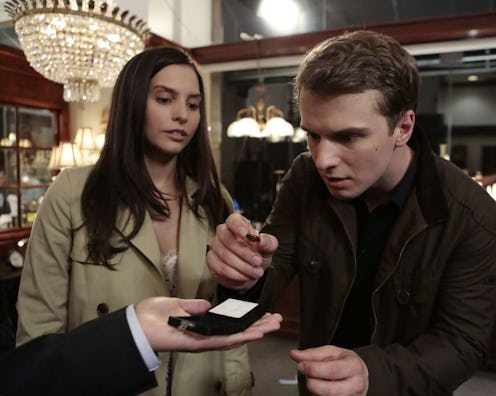Entertainment
'Time After Time' Strives To Empower Women

Add H.G. Wells, Jack the Ripper, and time travel together, and you have ABC's upcoming show Time After Time all figured out. The show focuses on the infamous serial killer making his way to our modern day world. But if you're wary about Jack the Ripper's violent crimes against women in the 19th century making the show misogynistic or difficult to watch even with the modern spin, actors Josh Bowman (Jack the Ripper) and Freddie Stroma (H.G. Wells) reassure Bustle that there's nothing to worry about. "[Jack] has goals, he has wants, and if anyone gets in the way of that, man or woman, he's going to take them out," Bowman says. "No, [his crimes are] not just reduced to women."
Time After Time even tries to empower the character of Jane Walker, a museum curator played by Génesis Rodríguez. Although she is Wells' love interest in the series, Stroma says she's so much more than that. "She’s also a heroine. She saves H.G. multiple times and she really helps him navigate in the modern world," he says.
The show, based on the 1979 film and Karl Alexander's novel of the same name, follows a young H.G. Wells as he chases former friend John Stevenson, aka Jack the Ripper, through time and into the modern day after the famous serial killer uses his time machine to avoid facing prosecution for his crimes. An idealist, Wells is horrified and disappointed to see that our modern world is not the utopia that he imagined, but instead a place where technology is often used to oppress and terrify the less fortunate. You know, the kind of place in which "realists," as Bowman describes his character in contrast to Stroma's, like Stevenson thrive.
The one bright spot in the darkness is meeting Jane, who not only helps Wells on his quest to track down his frenemy, but also becomes someone who inspires deep feelings in both men.
"She is the only person who is nice to [H.G. Wells], and she is the only hope of a possible utopian future, of humanity," Stroma explains to Bustle. "And that’s what that attraction is. She’s a little bit of everything. She helps him out. She’s a heroine. She’s a love interest." In short, she's everything.
"This is a 21st century woman," Bowman says, of his own character's reaction to Jane. "This is nothing that he’s ever seen before. She’s interesting to him, for whatever reason it is. She’s very dominant. She answers back. She’s not how a woman from his time would act. I think he finds that attractive, too. He’s intrigued."
Could Bowman's words be a hint that we have a love triangle on our hands? Personally, I can think of few things worse than being caught in a love triangle that involves Jack the Ripper, but, Time After Time's take on the killer doesn't sound like a two-dimensional bogeyman.
In fact, Bowman hints that there's a lot more going on beneath the charismatic criminal's surface that might charm viewers. "Towards the halfway point of the series, there’s an episode where we go back in time from where we are in 2017, and it’s really a redemptive episode for my character," he says. "He goes in search of someone that he wants to meet and it’s got an emotional underbelly for him. It’s not all about killing."
Whether you agree with the idea of portraying Jack the Ripper as someone who can be redeemed of his crimes or not, there's no arguing with Bowman's statement that Time After Time isn't all about killing. The actor describes it as a "family" show with far more going on than just violence, and with something for everyone. You'll laugh. You'll cry. You might even empathize.
But, most importantly, you'll see a well-written female lead of color who more than holds her own against two famous (and infamous) men. And that's something that TV can always use more of.